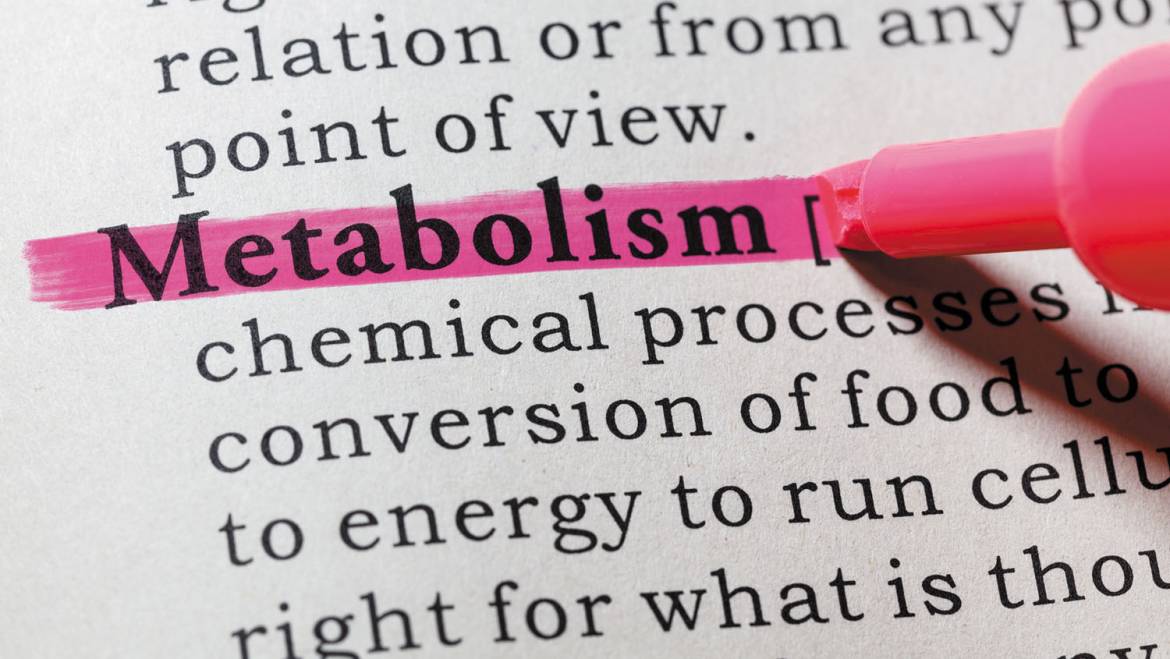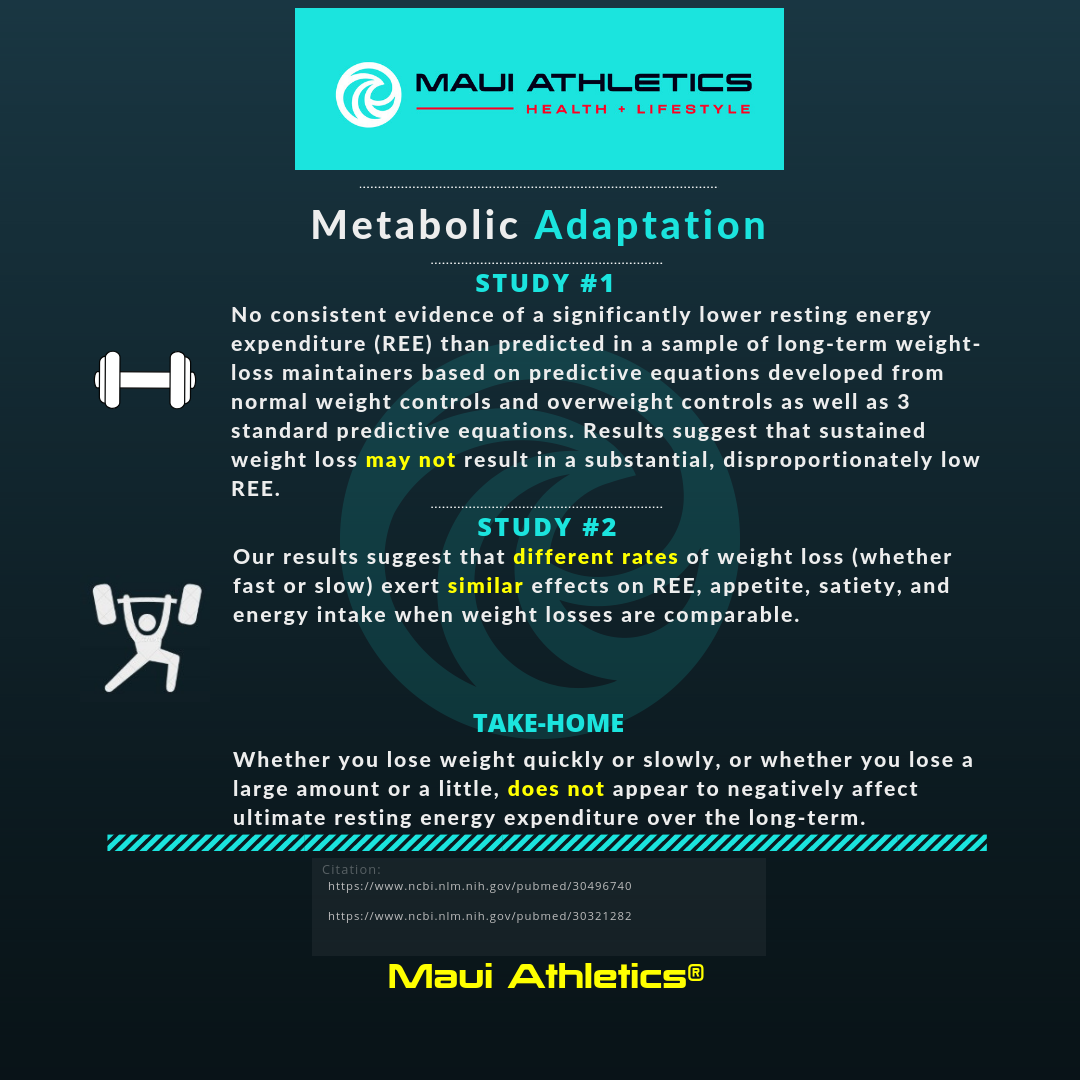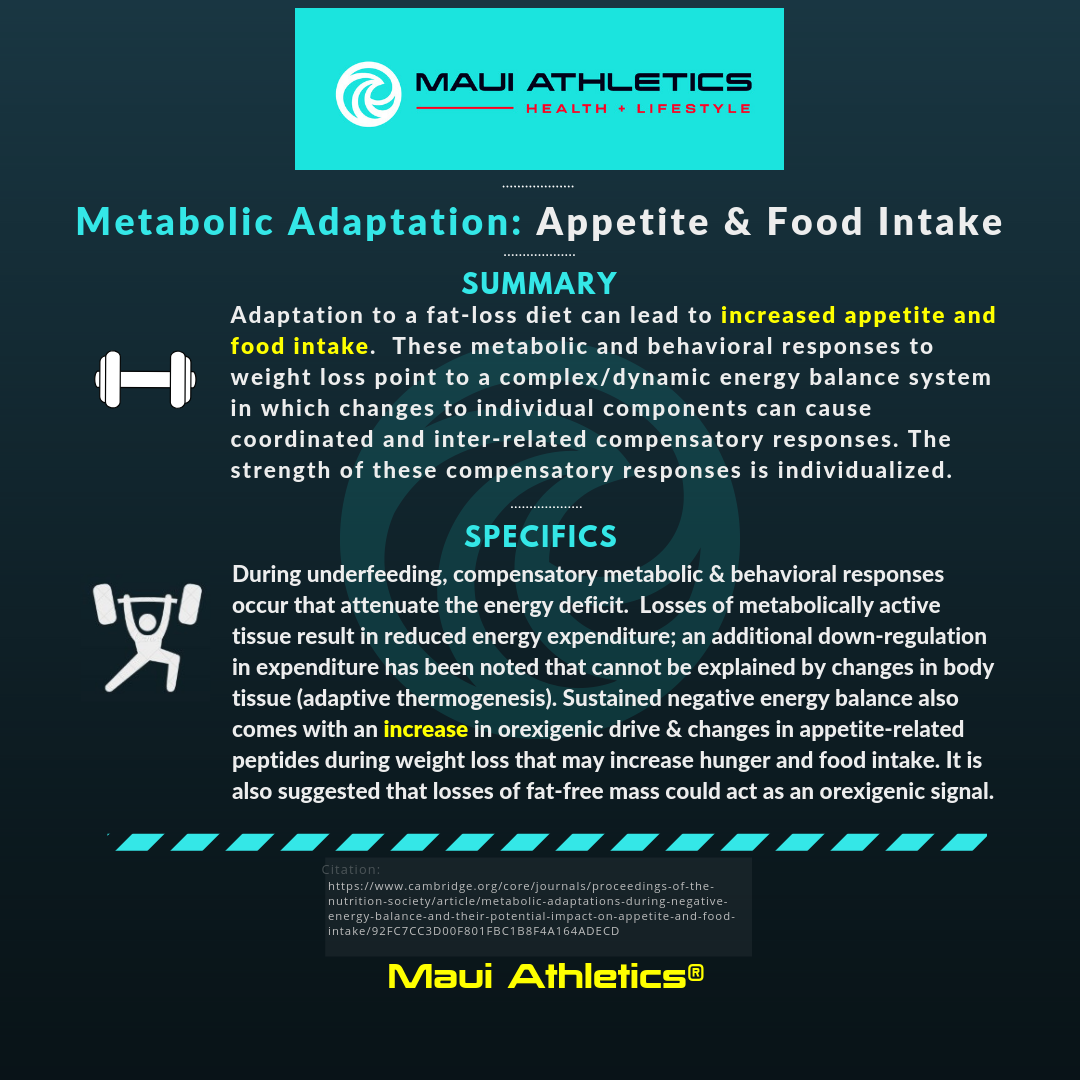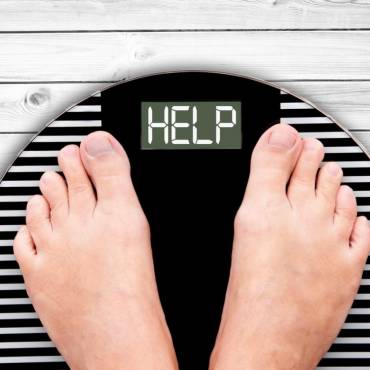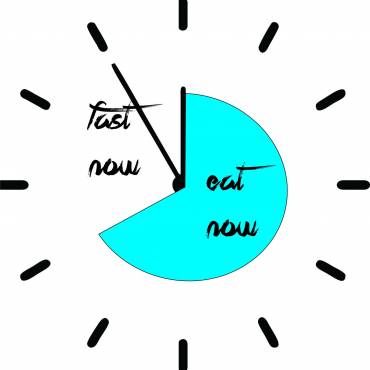Energy Balance, Metabolic Adaptation, And Starvation Mode
It’s All About the Calories
Weight loss and weight gain are driven by energy balance.1 Energy balance is a simplified concept to succinctly explain when and why weight change occurs. Contrary to popular belief, weight change is not guided by the time you eat, number of meals per day, often vilified carbs, insulin, or other hormones.14-29
It all comes down to calories.If you burn more calories than you take in, you lose weight. If you take in more calories than you burn, you gain weight. This is one of the immutable laws of thermodynamics and is commonly referred to as CICO or Calories In, Calories Out.
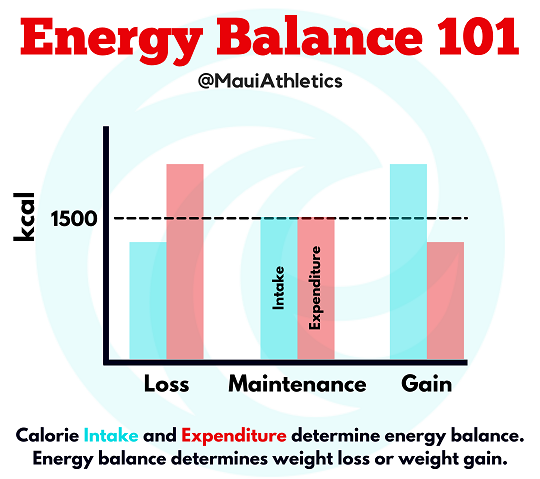

The information presented here helps to understand how your body adapts to these changes when attempting to lose weight and gives you insight into what you can do to reach your goals. I’ll also be covering one of the most persistent myths in nutrition. Enjoy!
Metabolic Adaptation
Metabolic Adaptation (or Adaptive Thermogenesis), a set of physiologic changes, tends to be the reason most people stall in their weight-loss journey.
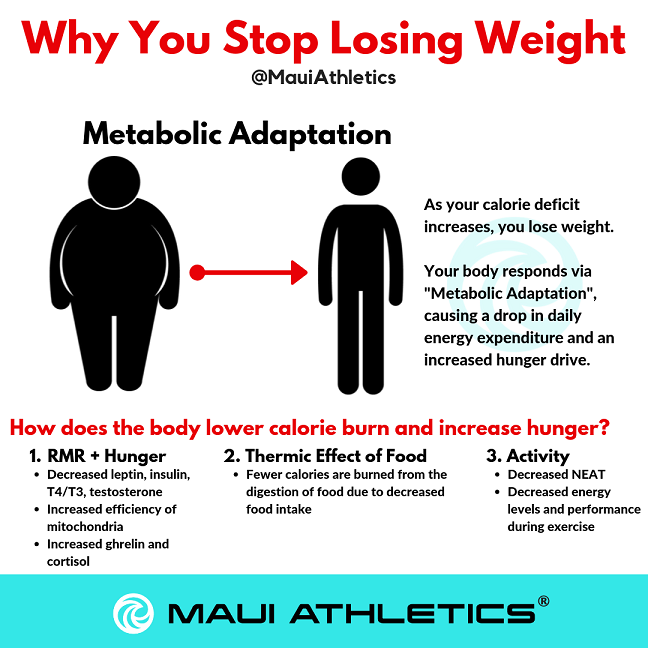

As a caloric deficit becomes more severe and/or prolonged, Total Daily Energy Expenditure (TDEE) decreases due to various mechanisms:
- The Thermic Effect of Food (TEF) decreases.
- Non-Exercise Activity Thermogenesis (NEAT) decreases.
- Resting Metabolic Rate (RMR) decreases.
- Thyroid hormones, Insulin, Testosterone, and Leptin become negatively affected.
- Mitochondria, and the body as a whole, become more efficient in conserving energy.
- Thyroid hormones, Insulin, Testosterone, and Leptin become negatively affected.
- Mitochondria, and the body as a whole, become more efficient in conserving energy.
All of these factors lead to the eventual “stall”, although cortisol increase is negligible unless completely fasting, and the decrease in Resting Metabolic Rate tends to be much less than people assume. In fact someone that drops from 200lbs to 150lbs has a basal metabolic rate nearly identical to what other 150-pound individuals have.Leibel 1995
On average, RMR decreases only about ~5 to 25 kcals per day in grown adults compared to predictive equations.Burgess, 1991; Fricker et al., 1991; Kreitzman et al., 1992; Martins et al., 2020 In the most extreme starvation experiments where individuals lost nearly 25% of their entire body weight over a five-month period, the additional drop in metabolic rate, after weight loss was accounted for, was ~75 to 100 kcals per day12,13,30,31 Therefore “metabolic damage”, as described by various fitness gurus, is largely a myth.
The main culprits for the “stall” are a decrease in activity levels and increased appetite/food intake.7 These are the body’s compensatory mechanisms for preventing starvation and thus a return to a weight settling point. They are the largest hurdles when trying to prevent weight-regain after a successful diet cycle.
For continued fat loss progress, two primary interventions are then required in isolation or in combination to counter these effects: increasing activity and/or decreasing calorie intake.
Starvation Mode/Metabolic Damage
The idea of metabolic damage or entering “starvation mode” is ubiquitous in the fitness world. This theory suggests that if you lose fat too fast or are in a calorie deficit too long that your body will somehow stop losing fat and somehow shift into storing body fat even when excess calories are not available. As mentioned before, this does not appear to be true.
Let’s get a baseline: when we look at the research, we find average metabolic rates are roughly in the 1300-1400 per day range for women and 1700 for men, if not more. Energy expenditure increases if you add physical activity into play.2,3
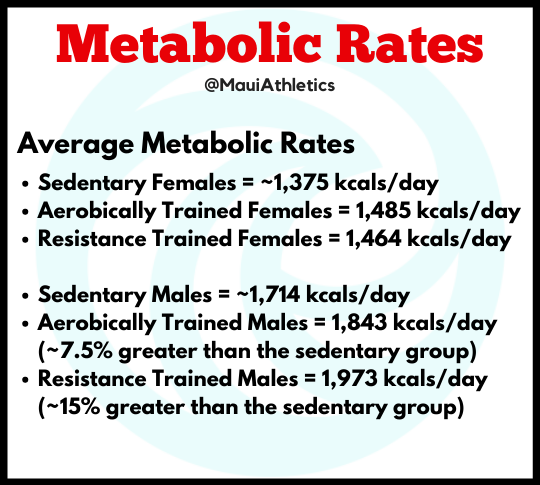

What is actually happening with people who claim to have such low-calorie intakes (and hence metabolic damage) is that they are underreporting their food intake (not intentionally) and metabolic adaptation that follows significant or long-term weight loss is ramping up.
Your body cannot create something from nothing. Ergo if you are in an energy deficit, you cannot “store” or create fat stores from a calorie source that does not exist. It is logically (and scientifically) impossible.
Very low-calorie diet research gives us insight into the fact that this doesn’t actually occur. When a low-calorie diet is controlled and accounted for, there is no way people do not lose a lot of weight.4-10 There has never been an example of the existence of “starvation mode” in any controlled setting. Hard stop.
Even in the most extreme weight loss study ever recorded, the Minnesota Starvation Experiment, the participants lost weight.11 This suggests that even though metabolic adaptation occurs (not the same thing as metabolic damage), that it is not significant enough to somehow completely prevent fat loss when a calorie deficit is present.
The more you know
Understand energy balance determines weight loss or weight gain, but it does not tell the story about what is lost, what is gained, or effects on health. Optimizing your protein intake and focusing on nutrient dense foods then becomes your next focus. Take your newfound understanding of metabolism and put it to good use!
Citations
- doi: 10.3945/ajcn.112.036350
- DOI: 10.1093/ajcn/56.6.968
- DOI: 10.1016/0026-0495(92)90107-l
- PMID: 2613403
- PMID: 2341229
- DOI: 10.1093/ajcn/56.1.275S
- doi: 10.1038/ijo.2010.184
- DOI: 10.1371/journal.pone.0004377
- DOI: 10.7326/0003-4819-119-7_part_2-199310011-00012
- DOI: 10.1079/bjn19940006
- https://doi.org/10.3945/ajcn.115.109173
- DOI: 10.1093/ajcn/nqy179
- DOI: 10.1093/ajcn/88.4.906
- DOI: 10.1126/science.aav0448
- doi: 10.1210/jc.2011-2525
- doi: 10.1053/j.gastro.2017.01.052
- Lammert O, Grunnet N, Faber P, Bjørnsbo KS, Dich J, Larsen LO, Neese RA, Hellerstein MK, Quistorff B. Effects of isoenergetic overfeeding of either carbohydrate or fat in young men. Br J Nutr. 2000 Aug;84(2):233-45. PMID: 11029975.
- DOI: https://doi.org/10.1038/sj.ijo.0803500
- https://doi.org/10.2337/db09-0098
- https://doi.org/10.3945/ajcn.116.133561
- doi:10.1001/jama.2018.0245
- DOI: 10.1093/ajcn/62.1.19
- https://doi.org/10.1093/ajcn/nqy390
- https://doi.org/10.1002/oby.22757
- DOI: 10.1093/ajcn/54.5.783
- DOI: 10.1093/nutrit/nuu017
- DOI: 10.1371/journal.pone.0038632
- DOI: 10.1002/oby.20032
- doi:10.1017/S0007114517002550
- Keys, A., Brozek, J., & Henschel, A. (1950a). The Biology of Human Starvation: Volume I.
- Keys, A., Brozek, J., & Henschel, A. (1950b). The Biology of Human Starvation: Volume II.
Additional Research
“In overweight women, metabolic adaptation at the level of RMR is minimal when measurements are taken under conditions of weight stability and does not predict weight regain up to 2 years follow-up.” Average weight loss was roughly 25lbs. RMR values were suppressed by only ~50kcal/day directly after weight loss, but returned to normal by 1 and 2 year follow-ups.
https://academic.oup.com/ajcn/article/112/3/558/5835207
“Outside the nutritional aspects, it might be wise to increase the physical activity and thus the energy flux of an individual when possible to maintain diet-induced body mass loss in the long term.”
DOI: 10.1519/JSC.0000000000003991
“[Metabolic adaptation] was likely not large enough in magnitude to be able to prevent weight loss or resist weight gain.”
https://doi.org/10.1093/ajcn/nqab184
“In this paper, we pursue the analysis of this phenomenon by demonstrating that an adaptive decrease in thermogenesis can have a major role in the occurrence of resistance to further lose fat in weight-reduced obese individuals. Evidence is also presented to support the idea of greater hunger sensations in individuals displaying more pronounced thermogenic changes. Finally, as the decrease in thermogenesis persists over time, it is also likely associated with a greater predisposition to body-weight regain after weight loss. Globally, these observations suggest that the adaptive reduction in thermogenesis that accompanies a prolonged negative energy balance is a major determinant of the ability to spontaneously lose body fat.”
https://doi.org/10.1038/ijo.2012.124
“[Metabolic adaptation] can be detected as early as the first week of daily caloric restriction.”
https://doi.org/10.1016/j.metabol.2020.154303
“These results show that in humans, evidence for adaptive thermogenesis is still inconsistent. However, they do not rule out the existence, but emphasize that if present, adaptive changes in energy expenditure may be too small to measure considering measurement errors, errors in assumptions made and small (day-to-day) differences in physical activity.”
https://doi.org/10.1186/1743-7075-3-25

